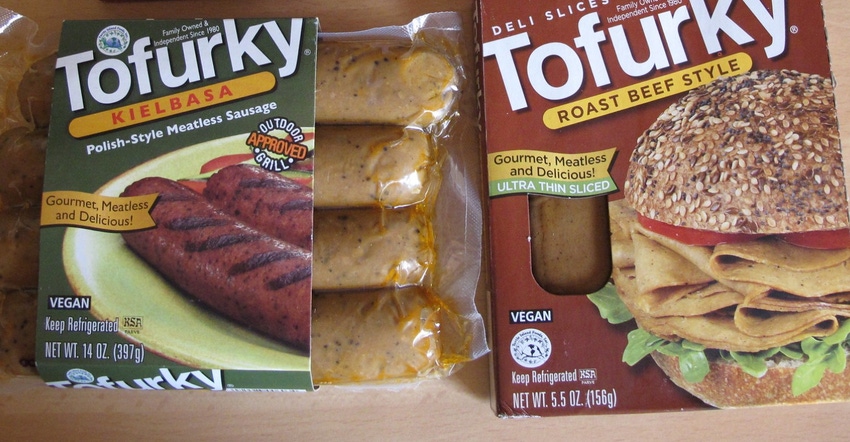
The United States Court of Appeals for the Eighth Circuit upheld Missouri’s labeling law preventing the use of common meat terms for plant-based alternatives. The case, Turtle Island Foods, SPC v. State of Missouri, otherwise known as the fake meat labeling case, offers a win for livestock producers who sought the rule. But the fight isn’t over as the plant-based food industry defends its actions against other state labeling laws.
Turtle Island Foods, operating as Tofurky, filed suit to obtain a preliminary injunction against a 2018 Missouri state statute that prevents “misrepresenting a product as meat that is not derived from harvested production livestock or poultry.” The District Court denied the request for preliminary injunction against the statute, and Turtle Island Food/Tofurky appealed to the U.S. Court of Appeals for the Eighth Circuit.
The court notes: “Everyone agrees that Tofurky’s labels do not misrepresent products as meat. The complaint alleges that the product labels ‘clearly indicate the products are plant based, meatless, vegetarian, or vegan.’”
“Ensuring that the food that Missourians buy is marketed correctly is of vital importance to both the consumers and the farmers and ranchers that produce that food,” says Missouri Attorney General Eric Schmitt “We will continue to defend the state against any further appeals or challenges in this case.”
In their opinion, the U.S. Court of Appeals for the Eighth Circuit stated, “Plaintiffs, Turtle Island Foods d/b/a The Tofurky Company (Tofurky) and the Good Food Institute (the Institute), brought a civil rights action under 42 U.S.C. § 1983 to challenge the constitutionality of Missouri Revised Statutes § 265.494(7) (the Statute), which criminalizes ‘misrepresenting a product as meat that is not derived from harvested production livestock or poultry.’ Plaintiffs moved for a preliminary injunction, which the district court denied.
“A bipartisan majority in the General Assembly made clear their intent to ensure marketing with integrity. Attorney General Schmitt and his team aggressively defended that intent and farm and ranch families are grateful,” says Mike Deering, executive vice president of the Missouri Cattlemen’s Association.
The plaintiffs argue there should be no discernable difference between this case and a suit brought by Tofurky to enjoin a relatively similar law in neighboring Arkansas. Turtle Island Foods v. Soman, 424 F. Supp. 3d 552, 573 (E.D. Ark. 2019). There, the district court granted the plaintiff’s motion for a preliminary injunction.
“We find the cases distinguishable based both on the scope of the statutory language at issue and the arguments raised by the parties therein,” the district court ruled.
Label censorship laws?
Under new laws, instead of “veggie burgers” and “plant-based sausages,” alternative protein companies are fighting back from having to use terms like “veggie disks” or “plant protein tubes” to describe their products.
Good Food Institute Regulatory Counsel Nigel Barrella explains, “Over the past few years, some lobbyists have sought to prevent plant-based producers from using ‘meaty’ words to describe their plant-based products, bringing their linguistic grievances to legislators across the United States.”
Michael Robbins, policy and media consultant at the Plant Based Foods Association, says the organization will continue to work with partners and allies on behalf of the industry, and plant-based food consumers, to ensure plant-based food companies can continue execute their First Amendment right to accurately and truthfully label their foods. PBFA currently is involved in the challenge of state laws in Oklahoma and Missouri indirectly, and is also presently fighting labeling bills in both Texas and Wisconsin.
“In Missouri, Oklahoma, Texas, Wisconsin and other states, the cattle and dairy lobbyists are working hard against us, seeking to distorting the free market in their favor to stifle competition from the innovative plant-based food industry,” Robbins says. “At the end of the day, the plant-based foods industry will succeed because we have the facts and the law, as well as consumers, on our side.”
Danielle Beck, National Cattlemen’s Beef Association’s senior executive director of government affairs, says while NCBA is aware of the alternative protein discussions playing out on a state-by-state basis, their focus continues to be on resolving this issue at the federal level.
“The Federal Food, Drug, and Cosmetic Act’s misbranding provisions are clear, but the Food and Drug Administration has failed to prioritize the enforcement of these regulations in a manner that ensures product labeling integrity when it comes to imitation meat products,” Beck says. “NCBA’s stance has and always will be that cattle producers welcome competition and consumer choice, but the regulations governing alternative protein products must protect consumer health and well-being, prevent false and deceptive marketing, and ensure a level playing field for real beef products and meat analogues alike.”
About the Author(s)
You May Also Like






